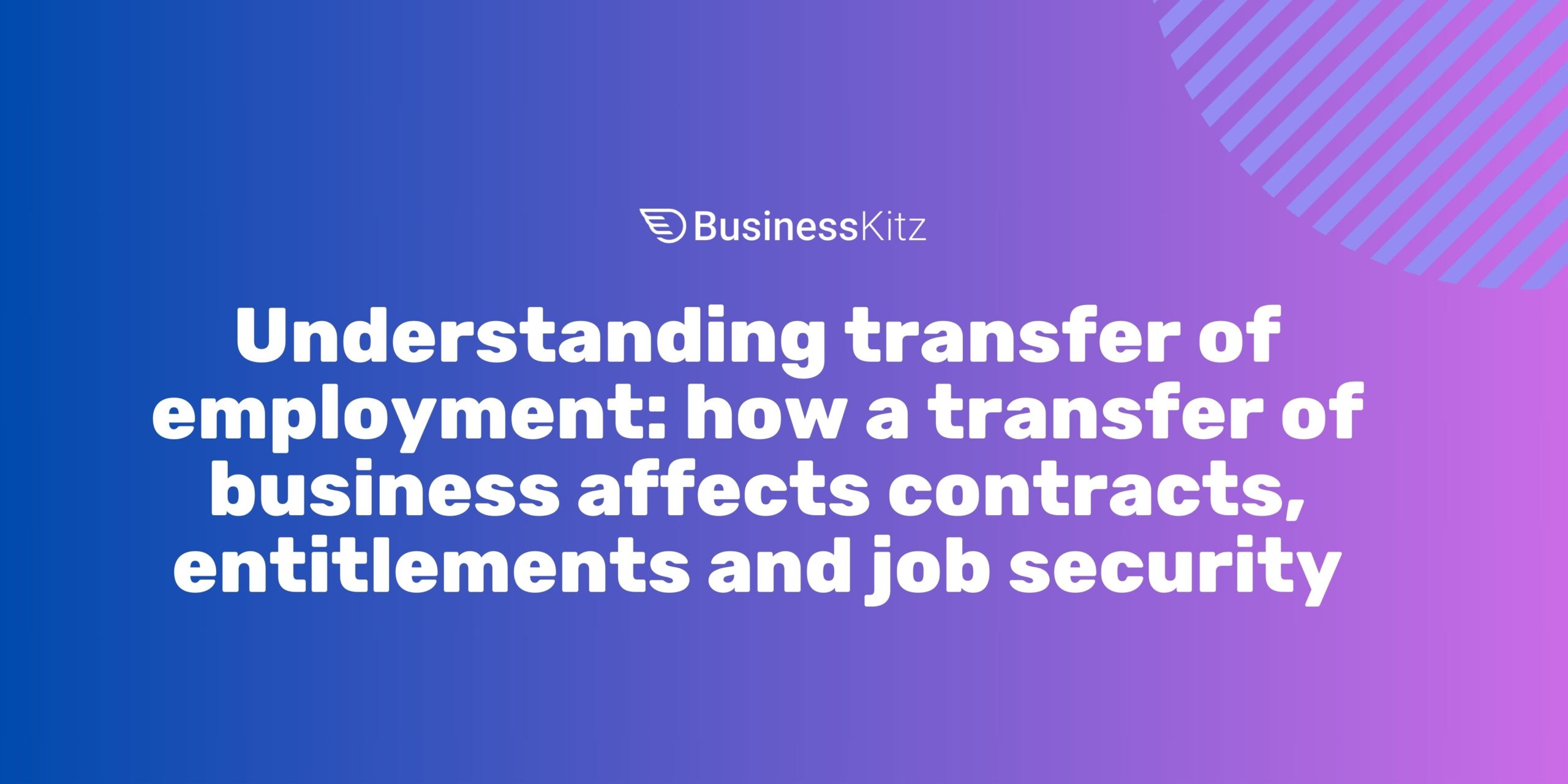
We've helped businesses save $55m with our all-in-one platform. Get instant access to this template and 115+ others, plus AI-powered document creation, starting completely free.
A transfer of employment can occur due to a sale, merger or restructuring. These changes can affect contracts, entitlements and job security. Employers must follow the Fair Work Act to ensure a smooth transition.[ez-toc]
A transfer of employment happens when a business changes owners and employees move to a new employer. The Fair Work Act protects workers by setting rules for job continuity, entitlements and contracts. Some benefits transfer, while others may be paid out. Employers must follow legal steps to avoid unfair dismissal and ensure a smooth transition.
A transfer of employment occurs when a business changes ownership and employees are shifted to a new employer. This can happen due to a transfer of business, merger, or restructuring. The Fair Work Act 2009 sets rules to protect employees in these situations. Businesses must understand how a transfer affects jobs, contracts, and employee entitlements.
A transfer of business happens when:
When this happens, employees may keep their existing roles, but their rights and entitlements may change.
A transfer of employment raises important issues:
Understanding these rules helps business owners and managers prepare for a smooth transfer.

Fair Work sets clear rules for when a transfer of employment happens. It applies when an employee leaves their old employer and starts with a new employer within three months. The new employer must also run the same or similar business, or the employee must perform largely the same work.
To decide if a transfer has taken place, the following must occur:
A connection exists if:
If these conditions apply, employees may keep their continuous service. This means their time with the old employer still counts for things like annual leave and long service leave.
The type of transfer affects whether the new employer must recognise past service.FactorAssociated entitiesNon-associated entitiesEmployment continuityUsually recognisedWould not be recognised unless agreedAnnual leaveTransfers to new rolePaid out by old employerLong service leaveMay continue to applyDepends on state lawsRedundancy payNot requiredOld employer must pay if service is not recognised
A transfer of business happens only if there is a legal or financial link between employers. A transfer does not occur if:
Understanding these rules helps employers follow the law and protects employees' rights.
A transfer of employment can affect an employee’s rights and benefits. Some entitlements continue to apply, while others may be paid out or reset. The outcome depends on whether the new employer recognises prior service and whether the transfer of undertaking includes existing agreements.
Some entitlements transfer to the new employer, while others depend on agreements between parties.EntitlementTransfers to new employerPaid out by old employerMay resetAnnual leaveYes, if new employer agrees to recognise prior serviceYes, if service is not recognisedNoLong service leaveDepends on state laws and employer agreementsYes, if service is not recognisedNoSick leaveYes, if new employer recognises prior serviceNoYes, if service is not recognisedRedundancy payNoYes, if old employer must pay due to non-recognitionNo
Entitlements transfer if:
Entitlements reset if:
Entitlements are paid out if:
A transfer of undertaking can impact employment contracts, awards, and agreements. In most cases:
Employers must:✔ Confirm if they will recognise prior service.✔ Review the impact of awards or enterprise agreements.✔ Provide employees with written terms before the transfer.Employees and managers should:✔ Check if entitlements like annual leave and long service leave will transfer.✔ Ask if the new employer will honour previous contracts.✔ Understand whether redundancy applies if the role does not transfer.By knowing their rights, both employees and employers can ensure a smooth transfer of business.

A transfer of business affects employees’ rights and working conditions. Fair Work sets rules that employers must follow to ensure a fair transition. A well-planned transfer policy can help employers manage this process smoothly.
Employers must:
Failing to meet these obligations can lead to legal claims, including unfair dismissal disputes.
Employers can take steps to ensure a smooth transition:✔ Communicate early – Inform employees about the transfer as soon as possible.✔ Consult with employees – Address concerns and explain how their rights will change.✔ Review contracts and agreements – Ensure compliance with awards, bargained enterprise agreements, and workplace policies.✔ Seek legal advice – Get expert input on complex cases, especially when dealing with non-associated entities.
A transfer policy ensures clear rules for managing staff transitions. It should include:
Employers can use this framework to create a clear policy:1. Purpose – Explain the aim of the policy and why it applies.2. Scope – Define which employees and situations the policy covers.3. Notice period – State how much notice employees receive before a transfer of undertaking.4. Entitlement management – Clarify whether the new employer must recognise past service.5. Redundancy and termination – Outline conditions for layoffs and payouts.6. Dispute handling – Provide steps for employees to raise concerns.A clear transfer policy ensures employees and managers understand their rights. Employers should review it regularly to stay compliant.Streamline your business documentation even further with Business Kitz. Business Kitz offers over 100 policy and agreement templates in our Document Library, provides secure storage for documents and employee data, and offers many more features for employee and company management. Get started today!
A transfer of business can lead to job losses if employees are not offered roles with the new employer. Employers must follow strict rules when making roles redundant to avoid unfair treatment. Fair Work sets out rights and protections for affected employees.
If a new employer does not take on an employee, the old employer must treat the role as redundant. This means:
Redundancy does not apply if the employee is reemployed by the new employer and their continuous service is recognised.
The type of transfer affects whether an employee gets redundancy pay.Employer connectionRedundancy payment required?Associated entity of the old employerNo, as service continuesNon-associated entitiesYes, if service is not recognisedIf the new employer does not recognise prior service, the old employer must pay redundancy entitlements.
Employers must ensure fair treatment by:✔ Giving proper notice before termination.✔ Paying all owed entitlements.✔ Offering support, such as redeployment within a company.✔ Explaining why the role is no longer needed.
Employees are protected from unfair dismissal if they are let go for invalid reasons. A dismissal may be unfair if:
A dismissal may be valid if:
Employers should refer to Fair Work rules and the National Employment Standards to ensure dismissals are managed in accordance with legal requirements.

A transfer of employment can affect an employee’s leave entitlements. The new employer may choose to recognise prior service, or the old employer must pay out leave balances before the transfer. Understanding how these entitlements work helps both employers and employees plan for changes.
Leave entitlements may be transferred, paid out or reset depending on the type of transfer. If the new employer is an associated entity of the old employer, leave entitlements usually carry over. If the old employer and the new employer have no formal connection, the old employer must pay out leave balances.
The new employer decides whether to recognise past service for leave accrual unless required by law. If they do, the employee keeps their period of service for future leave entitlements. If they do not, the old employer must pay out accrued leave before the employee’s employment ends.
Use this decision tree to determine how leave is handled:
Employers should refer to Fair Work legislation or engage a lawyer if unsure about how to manage employees leave during a transfer of employment.Businesses can strengthen their leave processes during a transfer by accompanying your transfer policy with Business Kitz Leave Policy Template. Ensure you have the right policies for your business and gain access to over 100 agreements, forms and policy templates - sign up today!
A transfer of business may impact an employee’s contract, entitlements or obligations. If the new employer agrees to recognise prior service, leave and redundancy rights may transfer. If not, the old employer must pay out accrued entitlements. Employees should check if their role, pay and conditions will stay the same under the new employer.
A transfer of undertaking happens when an entire business or part of it moves to a new employer. This may only occur when the incoming business owner takes over assets or operations. The Fair Work Act and the National Employment Standards apply to protect the rights of employees. Workers should confirm how the transfer affects their contracts and entitlements.
A transfer policy helps businesses manage staff transitions fairly. It provides a clear guide on notice periods, entitlements, and how the new employer will handle existing agreements. Employers must ensure policies comply with the National Employment Standards and other legal requirements. Employees who need more information should speak to a workplace relations professional or seek legal advice.
If the new employer is an associated entity of the old employer, prior service usually carries over. This means the transferred employee’s service counts for leave and redundancy. If the businesses are non-associated entities, the old employer must pay out entitlements before the transfer.
If the new employer recognises prior service, employees keep their benefits, including long service leave and redundancy. If not, the old employer must settle any outstanding entitlements. The service with the new employer then starts fresh. Employees should check their contracts to understand how the transfer of undertakings in Australia affects them.
No. New employees who join after a transfer of business do not get the same entitlements as those who transfer. Their conditions depend on the agreement they sign with the incoming business owner.
Employees should review their contracts, check their leave balances and ask how their service with the old employer is treated. If they have concerns, they should seek advice from a workplace relations professional. Employers should provide a list that sets out any changes before the transfer happens.
Yes, exceptions exist even in circumstances where a transfer of business takes place. If an employee takes a break of more than three months or applies for a new job elsewhere, their previous service does not count. The new employer does not have to recognise past entitlements unless they agree. Employers should seek legal advice if unsure of their obligations.
If you need more information, visit the Fair Work Ombudsman website or speak to a legal professional. Each transfer has a number of complexities, so it is important to understand how applicable legal provisions govern situations specific to your case.
A transfer of employment affects jobs, entitlements and legal obligations. Employers must follow Fair Work requirements to ensure a fair process.Key takeaways for businesses
Checklist for compliance✔ Notify employees in writing about contract or entitlement changes.✔ Confirm if leave and redundancy entitlements will transfer or be paid out.✔ Ensure fair consultation and avoid wrongful termination.✔ Review workplace policies to meet Fair Work Commission standards.✔ Seek legal advice if unsure about obligations.A transfer of business involves complex legal and HR processes. Business Kitz provides legal templates and business and employee management resources to help businesses manage employment contracts and entitlements. Sign up for a free Business Kitz account today! Disclaimer: This content is intended to be used for educational and informational purposes only. Business Kitz does not offer legal advice and cannot guarantee the accuracy, reliability, or suitability of its website content for a particular purpose. We encourage you to seek professional advice from a licensed professional and verify statements before relying on them. We are not responsible for any legal actions or decisions made based on the information provided on our website.Unless expressly stated otherwise, all content, materials, text, images, videos and other media on this website and its contents are the property of their respective copyright owners.
Copyright © 2025 Business Kitz 14312161